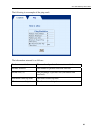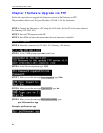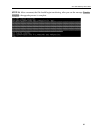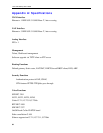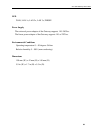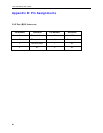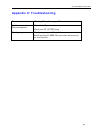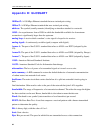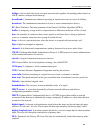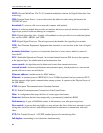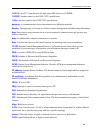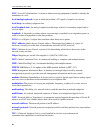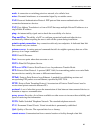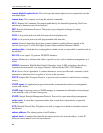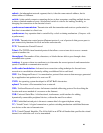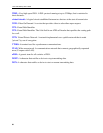
1813 VoIP Gateway User’s Guide
bridge: A device that links local or remote area networks together, forwarding packets based on
a MAC address (compare with Gateway).
broadband: Communication channels operating at transmission rates in excess of 64 kbps.
broadcast: The simultaneous transmission to two or more communication devices.
BT: Burst Tolerance. The limit parameter of the Generic Cell Rate Algorithm (GCRA).
buffer: A temporary storage used to compensate for a difference in the rate of flow of data.
bus: An assembly of conductors that carries signals to and from devices along its path and
serves as a common connection for a group of related devices.
busy: A device’s operational state, when the device is occupied with processing a call.
Byte: Eight bits arranged in sequence.
channel: A bi-directional communications pathway between a host server and a client.
CHAP: Challenge-Handshake Authentication Protocol. A PPP protocol to ensure authentication
of the connection between two devices.
circuit: A logical connection between two devices.
CO: Central Office, the local telephone exchange, also called PSTN.
COM port: A computer’s serial communications port.
CPE: Customer Premises Equipment. Equipment used by the end user.
cross talk: Undesired coupling of a signal from one circuit, or channel, to another.
data rate: The speed measured in bits per second that data is transferred over the carrier line.
Default: A pre-defined original value.
demodulation: The recovery, from a modulated carrier, of a signal.
DHCP server: A server that dynamically allocates network addresses and delivers
configuration parameters to hosts.
DHCP: Dynamic Host Configuration Protocol. A TCP/IP protocol that enables a network
connected to the Internet to automatically assign a temporary IP address to a host when the host
connects to the network.
digital signal: A discrete or discontinuous signal where the states are discrete intervals apart,
such as +10 volts and –10 volts. These states are then represented by the binary digits 0 and 1.
digital: loopback test: A test that connects the device’s receiver output back to the transmitter
input. This test will disrupt the transmission of primary data.
DLL: Dynamic Link Library. DLLs are files that are automatically loaded into memory when
required.
43



